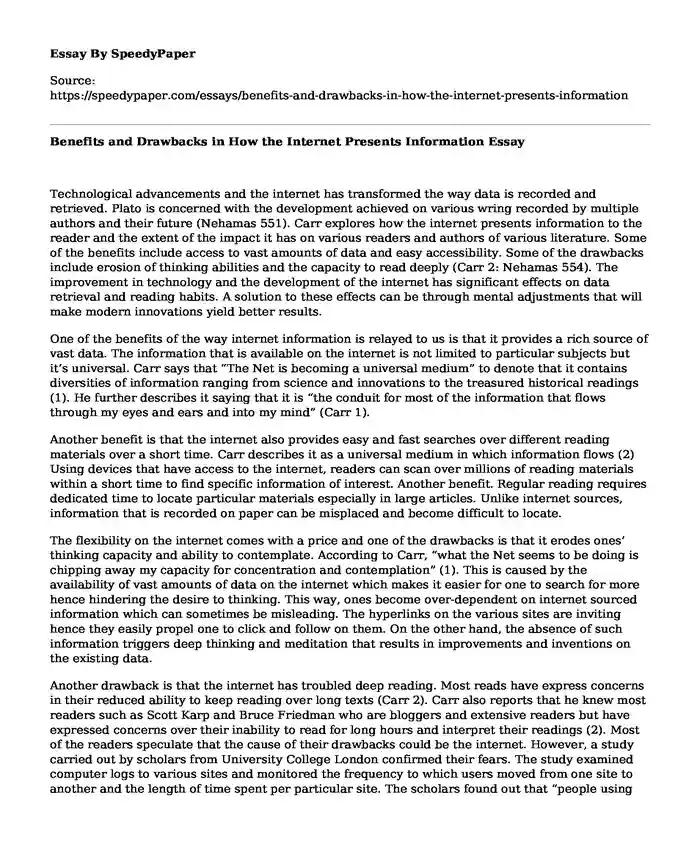
| Type of paper: | Essay |
| Categories: | Management Health and Social Care Nursing Food |
| Pages: | 3 |
| Wordcount: | 734 words |
Technological advancements and the internet has transformed the way data is recorded and retrieved. Plato is concerned with the development achieved on various wring recorded by multiple authors and their future (Nehamas 551). Carr explores how the internet presents information to the reader and the extent of the impact it has on various readers and authors of various literature. Some of the benefits include access to vast amounts of data and easy accessibility. Some of the drawbacks include erosion of thinking abilities and the capacity to read deeply (Carr 2: Nehamas 554). The improvement in technology and the development of the internet has significant effects on data retrieval and reading habits. A solution to these effects can be through mental adjustments that will make modern innovations yield better results.
One of the benefits of the way internet information is relayed to us is that it provides a rich source of vast data. The information that is available on the internet is not limited to particular subjects but it's universal. Carr says that "The Net is becoming a universal medium" to denote that it contains diversities of information ranging from science and innovations to the treasured historical readings (1). He further describes it saying that it is "the conduit for most of the information that flows through my eyes and ears and into my mind" (Carr 1).
Another benefit is that the internet also provides easy and fast searches over different reading materials over a short time. Carr describes it as a universal medium in which information flows (2) Using devices that have access to the internet, readers can scan over millions of reading materials within a short time to find specific information of interest. Another benefit. Regular reading requires dedicated time to locate particular materials especially in large articles. Unlike internet sources, information that is recorded on paper can be misplaced and become difficult to locate.
The flexibility on the internet comes with a price and one of the drawbacks is that it erodes ones' thinking capacity and ability to contemplate. According to Carr, "what the Net seems to be doing is chipping away my capacity for concentration and contemplation" (1). This is caused by the availability of vast amounts of data on the internet which makes it easier for one to search for more hence hindering the desire to thinking. This way, ones become over-dependent on internet sourced information which can sometimes be misleading. The hyperlinks on the various sites are inviting hence they easily propel one to click and follow on them. On the other hand, the absence of such information triggers deep thinking and meditation that results in improvements and inventions on the existing data.
Another drawback is that the internet has troubled deep reading. Most reads have express concerns in their reduced ability to keep reading over long texts (Carr 2). Carr also reports that he knew most readers such as Scott Karp and Bruce Friedman who are bloggers and extensive readers but have expressed concerns over their inability to read for long hours and interpret their readings (2). Most of the readers speculate that the cause of their drawbacks could be the internet. However, a study carried out by scholars from University College London confirmed their fears. The study examined computer logs to various sites and monitored the frequency to which users moved from one site to another and the length of time spent per particular site. The scholars found out that "people using the sites exhibited a form of skimming activity, hopping from one source to another and rarely returning to any source they had already visited" (Carr 2). Therefore, the study shows the internet provided an easy source of information where one could peruse and skim over many articles but erased their ability to read deeply.
The traditional data retrieval methods and reading habits have been considerably affected by the internet both positively and negatively. Internet facilitates fast access to huge amounts of data while on the other hand, it has eroded deep reading skills and thinking abilities. Since the internet provides other more benefits than drawbacks, it cannot be avoided; therefore, readers should find a way of adjusting to make the internet more useful.
Works Cited
Carr, Nicholas. "Is Google Making Us Stupid? What the Internet Is Doing to Our Brains," The Atlantic, July/August 2008. www.theatlantic.com/magazine/archive/2008/07/is-googlemaking-us- stupid/306868/
Nehamas, Alexander and Paul Woodruff. Phaedrus, Indianapolis, and Cambridge: Hackett Publishing Company, Inc., 1995, pp. 551-556.
Cite this page
Benefits and Drawbacks in How the Internet Presents Information. (2023, Apr 23). Retrieved from https://speedypaper.net/essays/benefits-and-drawbacks-in-how-the-internet-presents-information
Request Removal
If you are the original author of this essay and no longer wish to have it published on the SpeedyPaper website, please click below to request its removal:
- Essay Example: Leadership in Extreme Circumstances in the Novel The Killer Angels
- Essay Example on the Examining the Activities of the Green Party
- Free Essay Sample on Lifespan Motor Development
- Free Essay on Human Sexuality
- Evolution and Background of the Book Publishing Industry. Paper Example
- Peter Dahlgren, "Mediating Democracy". Free Essay Example
- Article Review: Effects of Anesthesia
Popular categories




